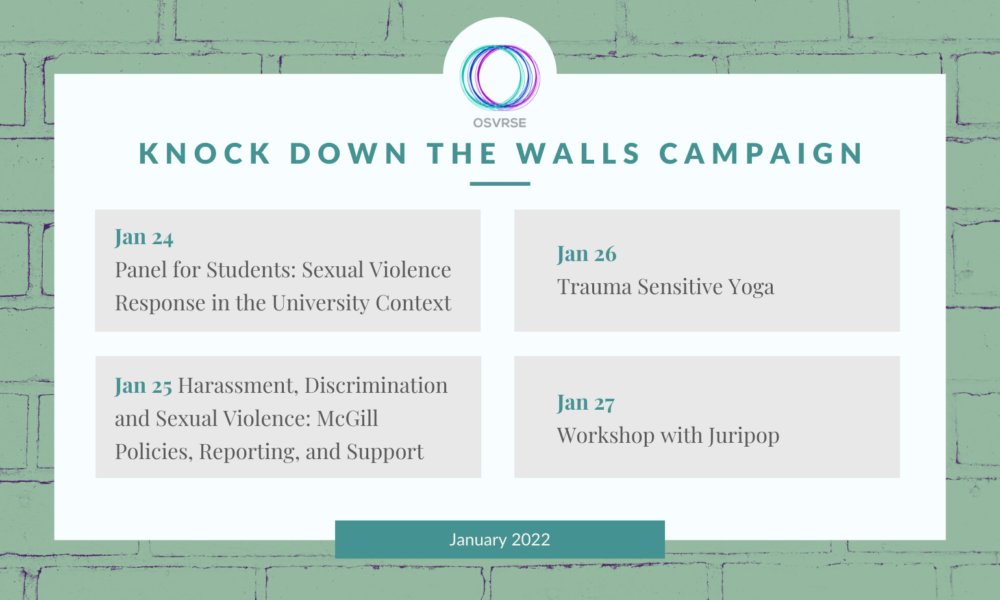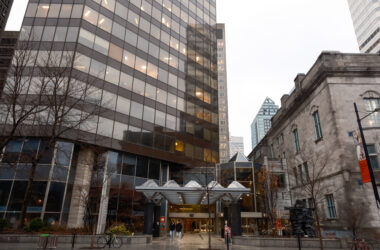Content warning: Sexual Violence
Each term, the Office for Sexual Violence Response, Support and Education (OSVRSE) hosts a week-long event with the aim to educate the public about resources available to survivors of sexual violence. This semester’s campaign, titled “Knock Down the Walls,” ran from Jan. 24 to Jan. 28. The week of virtual events included a “Panel for Students: Sexual Violence Response in the University Context” on Jan. 24, an information session called “Harassment, Discimination, and Sexual Violence: McGill Policies, Reporting, and Support” on Jan. 25, “Trauma-Sensitive Yoga” on Jan. 26, and a legal information workshop titled “Workshop with Juripop” on Jan. 27.
“It was suggested that a panel be held regarding the university response to sexual violence, where students could ask questions to key administrators on the processes and roles of different offices in responding to cases,” wrote Maha Cherid, Sexual Violence Education Advisor at OSVRSE, in an email to The McGill Tribune. “OSVRSE wanted to supplement this panel by providing information about the [Office for Mediation and Reporting] (OMR) and the provincial context. We therefore decided to focus our annual January campaign on making information about reporting and resources more accessible to students.”
Some of the “Knock Down the Walls” programming served as a response to criticisms from students regarding the administration’s response sexual assault allegations. The campaign’s sexual violence response panel, in particular, was focussed on addressing student concerns about the reporting procedure.
Isabella Kalarickal, U3 Arts, is the president of It’s On Us, a student group that has been committed to empowering survivors and ending sexual violence on campus since 2017. After controversy surrounding the allegations of repeated sexual assualt in New Residence Hall in Decemeber 2020, It’s On Us took a critical role in pushing for more transparency and communication from the McGill administration.
“Last year, It’s On Us decided to do several open forums where students could come in, and it’s a space for them to vent their frustrations, bring up concerns, ask questions, and just have a discussion amongst peers as to how […] this lack of response from administration is affecting them,” Kalarickal said. “It’s On Us compiled these concerns and questions, and we sent them off to McGill administration, just so hopefully one day they’ll look at it and they’ll realize what students are asking for and what students need.”
The “Sexual Violence Response in the University Context” panellists, including Émilie Marcotte, Sexual Response Advisor at OSVRSE, Fabrice Labeau, McGill Deputy Provost, Maha Cherid, Sexual Violence Education Advisor at OSVRSE, Robin Beech, McGill Dean of Students, and Sinead Hunt, Associate Director of the Office of Mediation and Reporting (OMR), responded to questions from the It’s On Us’ open forums, along with other student questions sent in via Google Form.
In an interview with the Tribune, Beech explained his belief that much of the frustration toward the response process comes from a place of miscommunication and speculation, especially as a result of the confidentiality required by the process.
“What was said on social media was extremely different to what was happening in reality,” Beech said. “There may be situations where a student finds themself in a class with somebody they believe […] is rumoured to have conducted sexual violence. If that happens, those students should contact me, and I can provide mental health support and advice and things, but I will not be able to release information about whether what they’re saying is true or not, for example. So, a lot of the problems come from the fact that [the process] must be confidential, and rumor-ville just goes wild.”
Though Kalarickal acknowledges that hosting the Sexual Violence Response panel is a positive step from administration, she still feels that their response process is inadequate.
“[It’s On Us] took the initiative and we sent them things that students had sent to us,” Kalarickal said. “So, it didn’t really come across as a genuine effort to connect and to address students [….] When we brought up the concerns from students saying that these policies are a bit lacking and don’t really ensure the survivors’ safety, they shifted a lot of the responsibility to Quebec law and to survivor autonomy, but that’s not really conducive to creating a safe space on campus. It’s not the survivor’s responsibility to ensure their protection.”
A virtual recording of the panel will be released shortly, and It’s On Us will link it on their social media platforms.
Sexual violence support is offered to the McGill community through McGill’s Office for Sexual Violence Response, Support and Education (OSVRSE), the Office for Mediation and Reporting (OMR), or the Sexual Assault Centre of the McGill Students’ Society (SACOMSS). OSVRSE can be reached at 514-398-3954, the OMR can be reached at 514-398-6419 or [email protected], and SACOMSS can be reached at (514) 398-8500 or [email protected].









